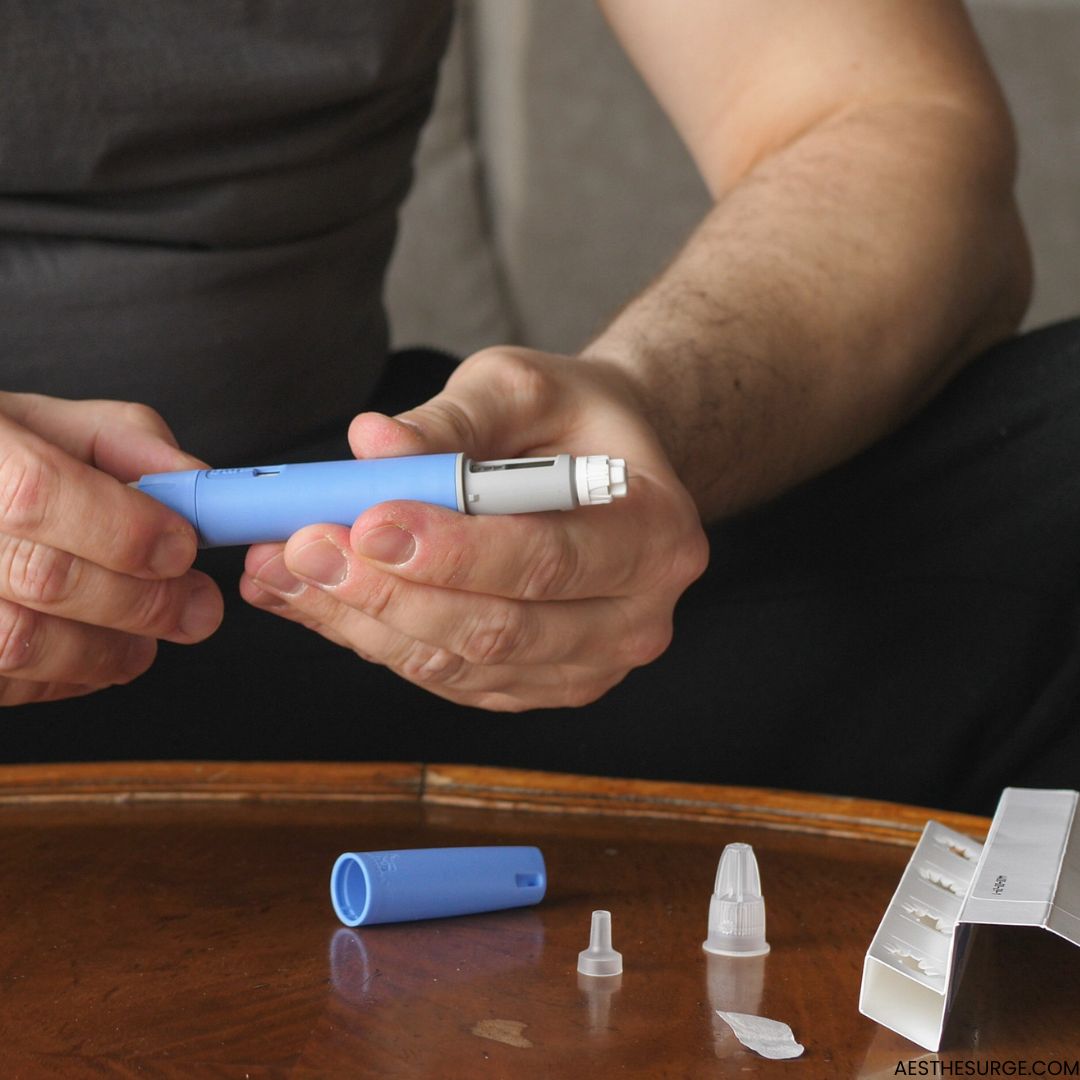Blog
Can stress anxiety & depression cause weight loss or gain

In today’s fast-paced world, stress, anxiety, and depression have become all too common. While these conditions are often associated with mental and emotional challenges, there is another unexpected consequence that many people may not be aware of: weight loss. Can stress anxiety & depression cause weight loss or gain? Yes, the silent symptoms of stress, anxiety, and depression can trigger an unexpected drop in numbers on the scale.
But how is this possible? Well, it turns out that these conditions can disrupt the body’s normal functioning, leading to changes in appetite, metabolism, and even the way our bodies store fat. This can result in a decrease in appetite, unintentional weight loss, and even changes in body composition. While weight loss may be welcomed by some, for others it can be a concerning and frustrating side effect of their mental and emotional struggles.
In this article, we will explore the intricate relationship between stress, anxiety, depression, and weight loss. We will delve into the science behind these connections, discuss the possible health implications, and provide practical tips for managing and addressing these silent symptoms. So if you’ve noticed unexpected weight loss and have been struggling with stress, anxiety, or depression, read on to gain a better understanding of how these factors may be interconnected.
The Silent Symptoms: How Stress, Anxiety, and Depression Can Trigger Unexpected Weight Loss
Increased cortisol levels, a hormone released during times of stress, can encourage fat storage. As a result, elevated cortisol levels brought on by stress can result in weight gain. Additionally, one’s appetite may change increasing or decreasing during melancholy periods.
How to lose weight with depression?
Increased strength training and aerobic exercise, ideally four times a week for at least 30 to 45 minutes, can boost metabolism and muscle tone while decreasing fat deposits. When paired with a consistent medication schedule, regular exercise has also been demonstrated to lower the chance of depression relapse.
The impact of stress on weight loss: Exploring the physiological effects
Stress is an inescapable part of human existence. While short-term stress can sometimes serve as a motivating force, chronic stress can have a multitude of detrimental effects on the body, especially when it comes to weight loss. Understanding the physiological impact of stress on weight can help individuals adopt better strategies to achieve their health goals.
1. Cortisol: The Stress Hormone
Cortisol, often dubbed the “stress hormone”, plays a pivotal role in the body’s stress response. However, when this hormone is consistently elevated due to ongoing stress:
- It can promote fat storage, especially in the abdominal region.
- It can lead to increased appetite and cravings for sugary or fatty foods.
- Prolonged elevated cortisol can also interfere with insulin sensitivity, potentially leading to weight gain or exacerbating conditions like Type 2 diabetes.
2. Impact on Metabolism
Chronic stress might negatively affect metabolic processes. Under stress, the body might slow down metabolic rates as a protective mechanism, conserving energy for what it perceives as “tough times” ahead. This slowdown can make weight loss more challenging.
3. Changes in Eating Behaviors
Emotional or stress-induced eating is common. Many individuals find solace in “comfort foods” which are often high in calories, fats, and sugars. Consuming these foods in response to stress, rather than hunger, can contribute to weight gain over time.
4. Disrupted Sleep Patterns
Stress is a known disruptor of sleep. When the body does not get adequate rest:
- It produces more ghrelin (the hunger hormone) and less leptin (the satiety hormone), leading to increased hunger and decreased feelings of fullness after eating.
- This imbalance can promote overeating and hamper efforts to shed weight.
5. Reduced Physical Activity
Under chronic stress, individuals might find it hard to muster the motivation or energy to exercise. Reduced physical activity, combined with stress-induced metabolic changes, can further impede weight loss.
6. Digestive Issues
Stress can affect gut health, leading to issues like bloating, constipation, or diarrhea. An unhealthy gut can hinder the absorption of essential nutrients, potentially stunting weight loss or even causing weight gain.

The role of anxiety in triggering weight loss: The link between the mind and metabolism
Anxiety is a prevalent condition affecting millions worldwide. While its psychological manifestations are widely acknowledged, the physiological repercussions, particularly its impact on metabolism and weight, are less commonly understood. This article delves into the link between anxiety and weight loss, exploring the intricate relationship between the mind and metabolic processes.
1. The Stress Response and Caloric Expenditure
Anxiety activates the body’s fight or flight response. This heightened state leads to an increase in energy expenditure as the body prepares to react to perceived threats. Over time and without adequate compensation through increased caloric intake, this can result in weight loss.
2. Suppressed Appetite
For some, anxiety can lead to a suppressed appetite. When overwhelmed with anxiety, the body’s sympathetic nervous system becomes more active, which can reduce feelings of hunger. Over prolonged periods, reduced caloric intake can significantly impact weight.
3. Digestive Disturbances
Chronic anxiety can affect the digestive system, leading to conditions such as:
- Gastric upset
- Nausea
- Diarrhea
These symptoms can deter regular eating habits, contributing to weight loss.
4. Increased Physical Activity
Restlessness and nervous energy are common symptoms of anxiety. Individuals might engage in pacing, fidgeting, or other unconscious movements more frequently. This constant motion, while seemingly minor, can increase overall caloric expenditure.
5. Malabsorption Issues
Anxiety has been linked to various gastrointestinal disorders, such as irritable bowel syndrome (IBS). Such conditions can hamper the body’s ability to absorb nutrients effectively, which can indirectly influence weight loss.
6. Impact on Mental Health and Behavior
Anxiety can lead to behaviors that interfere with a healthy diet:
- Skipping meals
- Forgetting to eat due to distraction or hyperfocus
- Opting for convenient, but not necessarily nutritious, food options
Depression and Weight Loss: Unraveling the Complex Relationship
Depression is a multifaceted mental health condition that can affect individuals differently, producing a wide range of physical and psychological symptoms. One of the manifestations that doesn’t always get as much attention is the relationship between depression and weight fluctuations. While some people with depression experience weight gain due to factors like increased appetite or reduced physical activity, others might face weight loss. This article aims to dissect the intricate relationship between depression and weight loss.
deoression is a multifaceted mental health condition that can affect individuals differently, producing a wide range of physical and psychology symptoms. One of the mangifestation that does’nt always get as much attention is the relationship between depresssion and weight fluctuations. Oneo
1. Diminished Appetite
For many with depression, a notable symptom is a reduced desire to eat or a lack of enjoyment in foods previously loved. This diminished appetite can lead to significant caloric deficits over time, resulting in weight loss.
2. Increased Metabolic Rate
Emerging research suggests that some individuals with depression may have a slightly increased resting metabolic rate, causing the body to burn calories more quickly than those without depression. Though the reasons behind this are not entirely clear, the consequence can be unintentional weight loss.
3. Neglect of Self-care
Depression can cause feelings of worthlessness or a lack of motivation to take care of oneself. This might manifest as neglecting basic needs, including eating, which can further exacerbate weight loss.
4. Gastrointestinal Symptoms
Depression often comes hand in hand with gastrointestinal issues like nausea, stomach cramps, and diarrhea. Such symptoms can deter regular eating patterns and contribute to nutrient malabsorption, leading to weight loss.
5. Sleep Disturbances
Insomnia or disrupted sleep is common among those with depression. Sleep plays a critical role in regulating hormones related to appetite and hunger. An imbalance in these hormones, such as ghrelin and leptin, can lead to reduced food intake and subsequent weight loss.
6. Medication Side Effects
Some antidepressant medications can cause weight loss as a side effect. While this might be beneficial for some, it can be problematic for those who are already underweight or losing weight due to their depression.
Recognizing the Silent Symptoms: Identifying Weight Loss as a Potential Sign of Stress, Anxiety, or Depression
Stress, anxiety, and depression are common mental health conditions that often manifest with a range of physical and emotional symptoms. While many people associate these conditions with weight gain, weight loss can also be a significant, albeit less recognized, symptom. This article aims to shed light on the silent symptoms of stress, anxiety, and depression, particularly focusing on unintentional weight loss.
1. Diminished Appetite
In times of stress, anxiety, or depression, it’s not uncommon for individuals to experience a decreased appetite. The heightened emotional turmoil can lead to a lack of interest in food or even aversion to eating, ultimately causing weight loss.
2. Digestive Disruptions
Stress, anxiety, and depression can wreak havoc on the digestive system, leading to symptoms such as nausea, stomach cramps, and diarrhea. These gastrointestinal issues can deter regular eating habits and contribute to weight loss.
3. Neglect of Self-Care
People experiencing high levels of stress, anxiety, or depression may struggle with self-care. This neglect can extend to basic activities like meal planning and preparation. Over time, inadequate food intake can result in weight loss.
4. Increased Physical Activity
In some cases, individuals might exhibit restlessness or engage in more physical activity when dealing with stress or anxiety. This unconscious energy expenditure can lead to calorie deficits and subsequent weight loss.
5. Insomnia and Sleep Disturbances
Sleep disturbances are common companions of stress, anxiety, and depression. Poor sleep can disrupt the balance of appetite-regulating hormones, leading to changes in eating habits, reduced caloric intake, and weight loss.
6. Medication Side Effects
Some medications used to manage these mental health conditions can have side effects, including appetite suppression and weight loss. Individuals prescribed these medications may experience unintended weight loss as a result.
The Importance of Seeking Help: The Benefits of Professional Support
Mental health challenges, whether they involve stress, anxiety, depression, or other conditions, can significantly impact one’s quality of life. Recognizing the importance of seeking professional support is a crucial step towards recovery and overall well-being. Here are some of the key benefits of seeking professional help:
1. Expertise and Guidance
Mental health professionals, such as therapists, counselors, and psychiatrists, have the expertise and training to understand and address the complexities of mental health issues. They can provide guidance tailored to an individual’s unique needs, helping to identify the root causes of their challenges and develop effective strategies for coping and recovery.
2. Confidential and Non-Judgmental Space
Professional support offers a safe and confidential environment where individuals can openly discuss their thoughts, feelings, and concerns. This non-judgmental space is essential for exploring difficult emotions, trauma, or issues that may be contributing to mental health challenges.
3. Customized Treatment Plans
Mental health professionals can create personalized treatment plans that may include therapy, medication, or a combination of interventions. These plans are tailored to address specific symptoms and needs, increasing the likelihood of successful recovery.
4. Coping Strategies and Skill Building
Through therapy and counseling, individuals can learn valuable coping strategies and skills to manage their mental health challenges effectively. These skills extend beyond the treatment period, empowering individuals to navigate future stressors and maintain emotional well-being.
5. Emotional Support
Professional support provides emotional validation and support during difficult times. The therapeutic relationship itself can be healing, offering individuals the opportunity to express their emotions and receive compassionate understanding.
6. Medication Management
For conditions that may require medication, mental health professionals can monitor and adjust medications as needed, ensuring the most effective treatment with minimal side effects.
7. Prevention of Escalation
Seeking help early can prevent the escalation of mental health issues. Addressing symptoms promptly can reduce the likelihood of more severe and debilitating conditions developing.
8. Improved Quality of Life
With professional support, individuals can experience an improved quality of life. They often find increased happiness, better relationships, and greater overall well-being.
9. Reduction in Risk Factors
Effective treatment can reduce the risk of complications such as substance abuse, self-harm, or other harmful behaviors that can be associated with untreated mental health issues.
10. Stigma Reduction
By seeking professional help, individuals contribute to the reduction of stigma surrounding mental health. This fosters a more open and supportive society for others facing similar challenges.

Managing stress, anxiety, and depression to prevent unintended weight loss
Managing stress, anxiety, and depression to prevent unintended weight loss involves a multi-faceted approach that addresses both the emotional and physical aspects of well-being. Untended mental health issues can lead to physical symptoms, including changes in appetite and unintended weight loss. Here are some general steps and strategies to consider:
- Professional Help: Always consider seeking professional help when dealing with stress, anxiety, and depression. A licensed therapist, counselor, or psychiatrist can provide invaluable guidance tailored to your specific needs.
- Medication: Some individuals benefit from medications that treat depression or anxiety. This is a conversation to have with a psychiatrist or primary care physician.
- Mindfulness and Meditation: Practices like mindfulness and meditation can help center the mind and reduce symptoms of anxiety and depression. They can help you become more aware of your body’s needs, including hunger cues.
- Regular Exercise: Physical activity can help manage symptoms of depression and anxiety. Exercise can act as a natural antidepressant by releasing endorphins and other feel-good chemicals in the brain.
- Balanced Diet: Eating a balanced diet with adequate calories is crucial. If your appetite is decreased, consider eating smaller, more frequent meals. Sometimes, it’s easier to eat when you’re not feeling overwhelmingly hungry.
- Social Support: Connect with friends, family, or support groups. Sharing your feelings and experiences can be therapeutic and provides a sense of belonging.
- Avoid Alcohol and Drugs: These can suppress appetite, lead to poor nutrition, and exacerbate feelings of depression and anxiety.
- Establish a Routine: A regular routine can provide structure and predictability during uncertain times. This includes regular meal times, sleep schedules, and self-care practices.
- Limit Stimulants: Reduce or eliminate caffeine, as it can increase anxiety in some people and potentially reduce appetite.
- Sleep: Prioritize good sleep hygiene. Sleep is deeply connected with mental health, and disruptions can exacerbate stress, anxiety, and depression.
- Stay Hydrated: Drink adequate water throughout the day. Sometimes, our bodies confuse thirst with hunger.
- Limit Stress: While it’s easier said than done, try to find strategies that help you manage stress. This could be through hobbies, relaxation techniques, or simply setting boundaries in personal and professional life.
- Journaling: Keeping a journal can help process feelings and identify triggers for stress, anxiety, and depressive episodes.
- Nutritional Supplements: If you’re not getting adequate nutrition due to a diminished appetite, consider talking to a doctor about multivitamins or other supplements.
- Set Goals: Set small, achievable goals for yourself, whether they relate to your mental health, physical health, or daily tasks.
Why people take stress following reason:
Remember, everyone’s journey with mental health is unique. What works for one person might not work for another. It’s essential to find what’s effective for you and to know that it’s okay to seek help. If unintended weight loss becomes severe or if there are other concerning symptoms, it’s vital to see a doctor.
Certainly! People experience stress for various reasons. Here’s a condensed list of common reasons why individuals might feel stressed:
- Work-related Issues:
- High workload
- Tight deadlines
- Job insecurity
- Conflict with coworkers
- Lack of work-life balance
- Financial Concerns:
- Debt
- Financial insecurity
- Unemployment
- Unexpected expenses
- Relationship Problems:
- Conflicts with a partner, family, or friends
- Divorce or separation
- Loneliness
- Health Challenges:
- Personal illness
- Chronic health conditions
- Caring for a sick relative
- Major Life Transitions:
- Moving
- Changing jobs
- Marriage
- Having a baby
- Bereavement
- Academic Pressures:
- Exams
- Academic performance
- Course workload
- Traumatic Events:
- Accidents
- Violence
- Natural disasters
- Daily Hassles:
- Traffic
- Household responsibilities
- Minor conflicts
- Personal Expectations:
- Perfectionism
- Fear of failure
- Social/Cultural Factors:
- Discrimination
- Societal or cultural pressures
- Technology-related Stress:
- Constant connectivity
- Information overload
- Uncertainty and Fear of Change
- Time Management Issues
- Mental Health Conditions:
- Anxiety
- Depression
- Environmental Stressors:
- Pollution
- Noise
The intensity and nature of stress can vary greatly between individuals. While one person might find a particular situation stressful, another might not. Recognizing the sources of stress and addressing them is crucial for mental and physical well-being.
Seeking professional help: Therapy, counseling, and medication options
If you or someone you know is experiencing challenges with mental health, it’s commendable to consider seeking professional help. There are several routes to consider based on the nature and severity of the symptoms:
- Therapy and Counseling:
- Cognitive Behavioral Therapy (CBT): This is a common type of talk therapy (psychotherapy) where individuals learn to recognize and change negative thought patterns and behaviors.
- Dialectical Behavior Therapy (DBT): A form of CBT that teaches behavioral skills to help people handle stress, manage emotions, and improve relationships.
- Interpersonal Therapy (IPT): Focuses on resolving interpersonal problems and symptomatic recovery.
- Psychodynamic Therapy: Explores how past experiences influence current behaviors and feelings.
- Family Therapy: Addresses family dynamics and how they affect individual family members.
- Couples/Relationship Counseling: Focuses on improving relationship dynamics and communication between partners.
- Medication:
- Antidepressants: Such as selective serotonin reuptake inhibitors (SSRIs) and serotonin-norepinephrine reuptake inhibitors (SNRIs) are used for depression and some anxiety disorders.
- Anxiolytics: Primarily for anxiety disorders. Benzodiazepines are a common class but are usually prescribed short-term due to concerns about dependence.
- Mood Stabilizers: Such as lithium, are used primarily for bipolar disorder.
- Antipsychotics: Used for conditions like schizophrenia or as adjunct treatment in other disorders, like depression.
- Stimulants: Mainly used for attention deficit hyperactivity disorder (ADHD).
- Always discuss potential side effects and interactions with a psychiatrist or primary care provider.
- Alternative and Complementary Therapies:
- Biofeedback: Teaches individuals to control physiological functions to improve a health condition or physical performance.
- Neurofeedback: A type of biofeedback that focuses on brain wave feedback.
- Hypnotherapy: Uses hypnosis to treat various ailments.
- Mindfulness and Meditation: Practices to cultivate presence and relaxation.
- Art or Music Therapy: Uses creative arts as a form of therapy.
- Support Groups:
- These are group meetings where members provide mutual support and learn from each other’s experiences. Examples include Alcoholics Anonymous or grief support groups.
- In-patient and Out-patient Programs:
- Some individuals might benefit from more intensive treatment programs, either in a day program (out-patient) setting or through a residential program (in-patient).
- Emergent Care:
- If someone is in crisis, they should seek immediate help, whether through a mental health professional, emergency room, or a crisis hotline.
Remember:
- It’s essential to find a professional or method that resonates with the individual’s needs.
- Sometimes, a combination of therapy and medication is most effective.
- It might take time to find the right therapist or medication, so patience and self-advocacy are crucial.
- Always consult with a professional before making any decisions about medication or therapy.
Conclusion: The importance of prioritizing mental health and seeking support
Mental health, akin to physical health, plays a fundamental role in an individual’s overall well-being. Our mental state influences how we think, feel, act, handle stress, relate to others, and make choices. Can stress anxiety & depression cause weight loss or gain. Prioritizing mental health is pivotal for several reasons:
- Holistic Health: Just as we wouldn’t neglect a physical injury or ailment, mental health concerns deserve the same level of care and attention. Neglecting one’s mental health can lead to further complications, both mentally and physically.
- Productivity and Potential: Good mental health can enhance one’s ability to work productively, foster creativity, and achieve their potential. Conversely, untreated mental health issues can hinder performance, impact relationships, and lead to a decline in overall quality of life.
- Relationships: Our mental state can affect our interactions and relationships with others. When we prioritize our mental well-being, it not only benefits us but also those we interact with daily, promoting harmony and understanding in relationships.
- Resilience: Mental health and resilience are closely interlinked. By addressing and managing mental health challenges, individuals can better adapt to adversities, cope with stress, and bounce back from challenges.
- Reduction in Stigma: Recognizing the importance of mental health and actively seeking support when needed can contribute to a societal shift, reducing the stigma associated with mental health issues.
- Overall Quality of Life: Mental health significantly influences our perception of life, happiness, and satisfaction. By prioritizing mental well-being, individuals can lead a more fulfilled, contented life.
Seeking support when it comes to mental health is not a sign of weakness but of strength. It’s an acknowledgment that everyone, at some point, needs help and that there are resources and professionals available to provide guidance. In a world full of complexities and challenges, ensuring that one has the mental tools and resilience to navigate life’s ups and downs is crucial. Thus, prioritizing mental health is not just a personal investment but also a contribution to healthier communities and societies at large.

Blog
Mounjaro Price in Pakistan

Introduction: Why Mounjaro is the Talk of the Town in Pakistan
In recent years, weight management and diabetes treatment have seen revolutionary advancements worldwide. One name that has gained massive attention both internationally and now in Pakistan is Mounjaro (Tirzepatide). Originally approved by the FDA for the treatment of type 2 diabetes, Mounjaro quickly became popular for its unparalleled weight loss results. Patients who previously struggled with obesity or poor metabolic control are now turning to Mounjaro as a life-changing solution.
But with this growing demand comes a very common question: What is the Mounjaro injection price in Pakistan, and where can you get it safely?
This detailed guide will cover everything you need to know about Mounjaro’s cost, benefits, availability, side effects, and comparison with other weight loss injections like Saxenda, Ozempic, and Wegovy. By the end, you’ll also learn why it is strongly recommended to get Mounjaro treatment at Aesthedoc Clinic Islamabad and Aesthesurge Clinic Rawalpindi — two of the leading names in medical aesthetics and weight loss management in Pakistan.
Mounjaro Price in Pakistan
The price of Mounjaro in Pakistan varies depending on the dosage strength, availability, and whether you are purchasing it directly from a pharmacy or receiving it under the supervision of a certified clinic.
- On average, the Mounjaro injection price in Pakistan ranges from PKR 90,000 to PKR 150,000 per pen depending on the milligram dosage and supply chain.
- Some online pharmacies claim to offer cheaper options, but patients are strongly advised to avoid unverified sellers, as counterfeit or expired products are a serious risk in Pakistan’s market.
- At Aesthedoc Clinic Islamabad and Aesthesurge Clinic Rawalpindi, Mounjaro treatment is provided under professional guidance, ensuring safe storage, correct dosage, and medically supervised administration.
💡 Pro tip for patients: Always remember that while the price matters, your safety and results depend on choosing a clinic that specializes in weight loss injections.
How Does Mounjaro Work?
Mounjaro contains Tirzepatide, a first-of-its-kind medication that works as a dual GIP and GLP-1 receptor agonist. Unlike traditional diabetes or weight loss medications that target just one pathway, Mounjaro works on two powerful mechanisms:
- Regulating blood sugar – improving insulin sensitivity and lowering glucose levels.
- Suppressing appetite & slowing digestion – making you feel full for longer, reducing calorie intake naturally.
This unique mechanism makes Mounjaro far more effective for weight reduction compared to alternatives like Saxenda or Ozempic.
Benefits of Mounjaro for Weight Loss & Diabetes
Mounjaro has been hailed as a game-changer because of its wide range of benefits:
- Rapid weight loss results – many patients lose up to 15–20% of their body weight over several months.
- Better diabetes management – improved blood sugar control for type 2 diabetic patients.
- Reduced appetite & cravings – making diet control easier.
- Long-term sustainability – patients often find weight loss easier to maintain.
- Boosted energy & confidence – thanks to a healthier metabolism.
For patients in Pakistan, this means a real solution to weight issues that were once only manageable through surgery or extreme dieting.
Mounjaro vs Saxenda vs Ozempic vs Wegovy
When searching for weight loss injections in Pakistan, you will come across multiple options. Here’s how Mounjaro compares:
| Injection | Active Ingredient | Avg. Price in Pakistan | Effectiveness for Weight Loss | Availability |
|---|---|---|---|---|
| Mounjaro | Tirzepatide | PKR 45,000 – 70,000 | ★★★★★ (Up to 20% body weight reduction) | Limited, available at top clinics |
| Saxenda | Liraglutide | PKR 25,000 – 35,000 | ★★★ (8–10% body weight reduction) | Widely available in pharmacies |
| Ozempic | Semaglutide | PKR 35,000 – 50,000 | ★★★★ (12–15% body weight reduction) | Available but often in shortage |
| Wegovy | Semaglutide (higher dose) | PKR 45,000 – 65,000 | ★★★★★ (Similar to Mounjaro, but higher cost) | Not widely available in Pakistan yet |
👉 As seen above, Mounjaro leads the race in terms of both effectiveness and popularity. While Saxenda and Ozempic remain strong alternatives, Mounjaro’s unique dual-action mechanism offers unmatched weight loss results.
Possible Side Effects of Mounjaro
Like any medication, Mounjaro may cause side effects, especially in the beginning. Common but usually mild symptoms include:
- Nausea
- Vomiting
- Diarrhea
- Decreased appetite
- Fatigue
Most of these symptoms improve as the body adjusts to the medication. However, this is exactly why professional supervision at a clinic is important. Self-injecting without medical guidance can increase risks.
Why You Should Choose a Clinic Instead of Self-Use
While some patients try to buy Mounjaro online or from unverified pharmacies, the risks are high:
- Fake or expired injections
- Incorrect dosage leading to complications
- No medical monitoring for side effects
- Poor storage (insulin-based injections require strict refrigeration)
At Aesthedoc Clinic Islamabad and Aesthesurge Clinic Rawalpindi, patients benefit from:
✅ Certified doctors & aesthetic physicians
✅ Proper dosage guidance
✅ Safe injection administration
✅ Regular progress monitoring
✅ Customized weight loss programs
FAQs on Mounjaro Price & Usage in Pakistan
1. What is the current Mounjaro price in Pakistan?
The average cost ranges between PKR 45,000 – 70,000 per pen, depending on the dosage.
2. Is Mounjaro better than Saxenda or Ozempic?
Yes, studies show Mounjaro offers more significant weight loss results than both Saxenda and Ozempic.
3. Can I buy Mounjaro without a prescription in Pakistan?
It is strongly advised to use Mounjaro under medical supervision only, as it requires proper dosage and monitoring.
4. How long before I see results?
Most patients notice weight loss within 4–6 weeks, with significant results over 3–6 months.
5. Where can I get Mounjaro injections in Islamabad and Rawalpindi?
You can safely receive treatment at Aesthedoc Clinic Islamabad or Aesthesurge Clinic Rawalpindi, where certified experts administer the injections.
Final Thoughts: Transform Your Weight Loss Journey with Mounjaro
Mounjaro is not just another weight loss trend — it is a scientifically proven, FDA-approved solution that has changed the lives of thousands worldwide. In Pakistan, it is now available for patients who are serious about taking control of their weight and health.
While the Mounjaro price in Pakistan may seem high compared to alternatives, the results, safety, and life-changing impact make it worth every rupee.
💡 If you’re ready to begin your journey, book your consultation today at:
👉 Aesthedoc Clinic Islamabad
👉 Aesthesurge Clinic Rawalpindi
Take the first step toward a healthier, more confident you.
Blog
Face Lift Treatment Options

As individuals age, visible signs such as wrinkles, sagging skin, and facial volume loss begin to appear. A face lift is a proven aesthetic procedure designed to address these concerns, restoring a youthful, refreshed appearance. Whether you’re noticing fine lines around the mouth or deeper folds near the cheeks and jawline, modern face lift options offer both non-surgical and surgical solutions tailored to your unique needs.
What Is a Face Lift?
A face lift, also known as rhytidectomy, is a cosmetic treatment aimed at reducing visible signs of aging in the face and neck. This procedure targets sagging skin, deep creases, jowls, and loose skin on the neck, providing a tighter and more contoured look.
Types of Face Lift Treatments Available
1. Non-Surgical Face Lift Treatments
Non-invasive techniques are becoming increasingly popular for individuals looking for minimal downtime and subtle yet noticeable results.
- HIFU (High-Intensity Focused Ultrasound)
This non-invasive treatment uses ultrasound energy to stimulate collagen production and tighten skin naturally, often referred to as a “lunchtime lift.” - Thread Lift
A procedure involving dissolvable threads placed under the skin to lift and tighten sagging areas. It stimulates collagen while providing immediate elevation. - Dermal Fillers & Botox
While not traditional lifts, these injectables help restore facial volume, smooth wrinkles, and improve contour—ideal for early signs of aging. - Radiofrequency (RF) Skin Tightening
RF energy penetrates the skin to boost collagen and elastin, tightening loose skin with no cuts or needles involved.
2. Surgical Face Lift Options
Surgical procedures offer more dramatic and long-lasting results, suitable for moderate to advanced signs of aging.
- Traditional Full Face Lift
This comprehensive approach targets deep wrinkles, sagging cheeks, jowls, and excess neck skin. It involves repositioning facial tissues and removing excess skin for a refined appearance. - Mini Face Lift
A less invasive version, the mini face lift targets early signs of aging, particularly around the jawline and lower cheeks, with smaller incisions and quicker recovery. - Mid-Face Lift
Specifically designed to lift the area around the cheeks and under the eyes, restoring a fuller and youthful facial contour. - Neck Lift (Lower Rhytidectomy)
Often performed alongside a face lift, this focuses on removing sagging skin and fat deposits in the neck region.
Benefits of Face Lift Treatments
- Reduces sagging and wrinkles
- Enhances jawline definition
- Restores youthful facial volume
- Boosts confidence and self-image
- Long-lasting, natural-looking results
Who Is the Ideal Candidate?
Face lift procedures are ideal for individuals experiencing:
- Sagging facial skin
- Deep nasolabial folds
- Jowls or a double chin
- Loss of skin elasticity
- A desire for long-term rejuvenation
Both men and women between the ages of 35 and 65 commonly consider these treatments based on their skin condition and aesthetic goals.
Recovery and Aftercare
Recovery times vary depending on the procedure. Non-surgical options require little to no downtime, while surgical face lifts may take 2–3 weeks for full recovery. Proper skincare, hydration, and sun protection are essential for maintaining results.
Where to Get Face Lift Treatments in Islamabad & Rawalpindi?
If you’re considering a face lift to restore your youthful appearance, two highly regarded options in the region are:
- Aesthedoc Clinic Islamabad – Offering advanced non-invasive and surgical face lifting techniques with a focus on precision and patient satisfaction.
- Aesthesurge Clinic Rawalpindi – Known for its comprehensive cosmetic services, this clinic provides safe and effective face lift procedures using the latest technologies.
Rediscover your confidence with personalized face lift treatments today. Book your consultation at Aesthedoc Clinic in Islamabad or Aesthesurge Clinic in Rawalpindi and start your journey toward a younger, revitalized you.
Blog
Hymen Repair Surgery Treatment Results in Pakistan

Hymen repair surgery, also known as hymenoplasty, is a minor surgical procedure that reconstructs the hymen—a thin membrane located at the vaginal opening. In Pakistan, this procedure is increasingly sought for personal, cultural, and social reasons. Whether you’re preparing for marriage or seeking restoration after trauma, this article provides a complete guide to the procedure, recovery, results, and more.
What Is Hymen Repair Surgery?
The hymen can tear due to various non-sexual or sexual reasons, such as sports, injury, or intercourse. Hymenoplasty involves carefully stitching the torn edges of the hymen to recreate a membrane that mimics the natural structure.
The procedure:
- Is performed under local or general anesthesia
- Takes approximately 1 to 2 hours
- Is conducted as an outpatient procedure, allowing same-day discharge
At Aesthedoc, highly trained aesthetic physicians and plastic surgeons in Pakistan use advanced techniques to ensure results that are both discreet and natural-looking.
Why Women Choose Hymen Repair in Pakistan
In many Pakistani communities, the hymen symbolizes virginity, leading some women to opt for hymenoplasty to align with societal or cultural expectations. Other reasons include:
- Avoiding pre-marital stigma
- Healing from sexual trauma or abuse
- Correcting congenital absence of hymenal tissue
Each woman’s decision is deeply personal. Clinics such as Aesthedoc prioritize confidentiality and emotional well-being, ensuring compassionate, private care.
How the Hymenoplasty Procedure Works
- Initial Consultation: The specialist reviews your health history, expectations, and goals.
- Surgical Process: The torn edges of the hymen are stitched. If the tissue is absent, a small artificial membrane may be created.
- Post-Procedure Care: Patients return home the same day. Dissolvable stitches typically fade within 2–3 weeks.
Post-Surgery Recovery and Aftercare
Proper aftercare is essential for healing and natural results:
- Avoid physical exertion or intense exercise for 2–4 weeks
- Maintain hygiene and follow aftercare instructions
- Abstain from intercourse for 6–8 weeks
Most women return to regular activities within 7 days, with full recovery by 6–8 weeks.
Results of Hymen Repair Surgery in Pakistan
Pakistan-based clinics like Aesthedoc report high levels of patient satisfaction. Expected outcomes include:
- Natural appearance and texture
- Minimal or no visible scarring
- High success rate with long-term results (until next rupture)
Note: The hymen does not regenerate after it breaks again.
How to Choose a Trusted Hymen Repair Surgery Clinic in Pakistan
Selecting a clinic with the right expertise ensures your safety, comfort, and desired outcome. Look for:
- Certified Aesthetic Physicians & Plastic Surgeons
- Strong privacy policies
- Sterile, modern surgical facilities
- Transparent pricing and consultation support
Clinics like Aesthedoc are committed to providing discreet, professional, and respectful care.
FAQs About Hymen Repair Surgery in Pakistan
Q1: Is hymenoplasty painful?
A1: The procedure is mostly painless due to local anesthesia. Some soreness may occur for a few days post-surgery.
Q2: Can the surgery be detected?
A2: No. The reconstructed hymen looks and feels natural. Even doctors cannot tell unless informed.
Q3: What is the cost of hymen repair in Pakistan?
A3: Prices range from PKR 50,000 to PKR 150,000, depending on the case and clinic.
Q4: Are there any side effects?
A4: Side effects are rare but may include mild swelling, discomfort, or infection—all manageable with standard care.
Q5: When can I get married after surgery?
A5: It’s best to wait 6–8 weeks post-surgery for full healing before marriage or sexual activity.
Confidential Hymenoplasty Services at Aesthedoc
At Aesthedoc, our team of qualified aesthetic physicians and plastic surgeons provides safe, private, and non-judgmental hymen repair services. We offer:
- Personalized consultations
- Modern surgical care
- Affordable, transparent packages
- Patient-centered support in a confidential environment
Final Thoughts
Hymenoplasty in Pakistan is a safe, effective, and confidential solution for women seeking restoration for cultural, emotional, or medical reasons. With experienced professionals at Aesthedoc, patients receive respectful care with the utmost privacy.
If you’re considering hymen repair surgery, book a confidential consultation today. Aesthedoc is here to support your journey—discreetly and professionally.
-

 Blog11 months ago
Blog11 months agoFace Lift in Islamabad
-

 Blog8 months ago
Blog8 months agoLaser Skin Tightening in Rawalpindi Islamabad Lahore
-

 Blog3 months ago
Blog3 months agoMounjaro Price in Pakistan
-

 Blog8 months ago
Blog8 months agoPRP Stem Cell Exosomes in Pakistan AestheSurge
-

 Blog8 months ago
Blog8 months agoHymen Repair Surgery Treatment Results in Pakistan
-
Blog2 years ago
Weight Loss Injections, Saxenda Injection Treatment Price in Pakistan
-

 Blog8 months ago
Blog8 months agoMicroneedling Treatment Cost in Pakistan AestheSurge
-

 Blog8 months ago
Blog8 months agoHIFU Treatment Cost in Pakistan